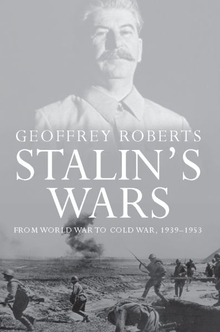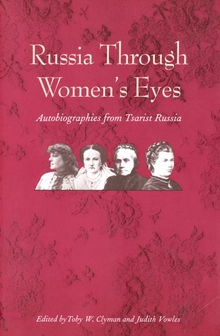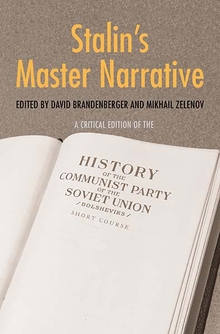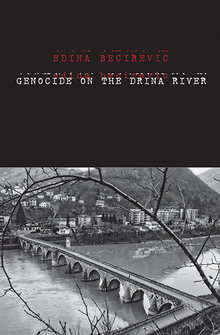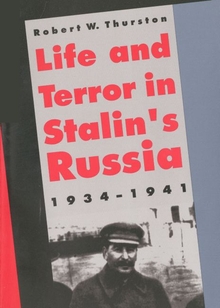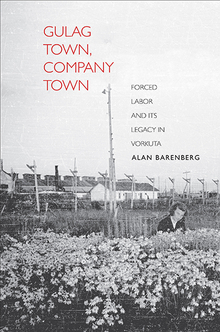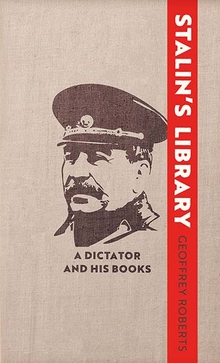Stalin's Wars
WARNING
You are viewing an older version of the Yalebooks website. Please visit out new website with more updated information and a better user experience: https://www.yalebooks.com
From World War to Cold War, 1939-1953
Geoffrey Roberts
A provocative reassessment of Stalin’s military and political leadership during the most important years of his career
This breakthrough book provides a detailed reconstruction of Stalin’s leadership from the outbreak of the Second World War in 1939 to his death in 1953. Making use of a wealth of new material from Russian archives, Geoffrey Roberts challenges a long list of standard perceptions of Stalin: his qualities as a leader; his relationships with his own generals and with other great world leaders; his foreign policy; and his role in instigating the Cold War. While frankly exploring the full extent of Stalin’s brutalities and their impact on the Soviet people, Roberts also uncovers evidence leading to the stunning conclusion that Stalin was both the greatest military leader of the twentieth century and a remarkable politician who sought to avoid the Cold War and establish a long-term detente with the capitalist world.
By means of an integrated military, political, and diplomatic narrative, the author draws a sustained and compelling personal portrait of the Soviet leader. The resulting picture is fascinating and contradictory, and it will inevitably change the way we understand Stalin and his place in history. Roberts depicts a despot who helped save the world for democracy, a personal charmer who disciplined mercilessly, a utopian ideologue who could be a practical realist, and a warlord who undertook the role of architect of post-war peace.
This breakthrough book provides a detailed reconstruction of Stalin’s leadership from the outbreak of the Second World War in 1939 to his death in 1953. Making use of a wealth of new material from Russian archives, Geoffrey Roberts challenges a long list of standard perceptions of Stalin: his qualities as a leader; his relationships with his own generals and with other great world leaders; his foreign policy; and his role in instigating the Cold War. While frankly exploring the full extent of Stalin’s brutalities and their impact on the Soviet people, Roberts also uncovers evidence leading to the stunning conclusion that Stalin was both the greatest military leader of the twentieth century and a remarkable politician who sought to avoid the Cold War and establish a long-term detente with the capitalist world.
By means of an integrated military, political, and diplomatic narrative, the author draws a sustained and compelling personal portrait of the Soviet leader. The resulting picture is fascinating and contradictory, and it will inevitably change the way we understand Stalin and his place in history. Roberts depicts a despot who helped save the world for democracy, a personal charmer who disciplined mercilessly, a utopian ideologue who could be a practical realist, and a warlord who undertook the role of architect of post-war peace.
Geoffrey Roberts is professor of history at the University College Cork, Ireland. He is a frequent contributor to British, Irish and American newspapers and to popular history journals and he has acted as a consultant for a number of TV and radio documentaries. His publications include Victory at Stalingrad (Longman/Pearson, 2002) and The Soviet Union in World Politics (Routledge, 1998).
"This breakthrough book provides a detailed reconstruction of Stalin's leadership from the outbreak of World War Two in 1939 to his death in 1953. Making use of a wealth of new material from Russian archieves, Geoffrey Roberts challenges a long list of standard perceptions of Stalin: his qualities as a leader; his relationships with his own generals and with other great world leaders; his foreign policy and his role in instigating the Cold War."---Military Illustrated
"...an astonishing defence of the Soviet dictator...This will provoke lively debate and is a must-read for anyone with an interest in Stalin and his times."---BBC History Magazine
"...a brilliant revisionist analysis of the Soviet dictator as he became a global leader."---Kevin Myers, Irish Independent
"A tremendous amount of scholarly and documentary research has gone into this volume, and for that alone it merits the highest praise."—Arnold Beichman, New York Post
"A remarkable historical work."—Joseph C. Goulden, Washington Times
"Using new archival material, Roberts carves a figure who grew with the war, got the most from his people and his generals, and held the country together as a lesser force could not have. Moreover, he says, Stalin wanted to preserve cooperation and peace with his wartime allies after 1945, admittedly on his terms. Had Winston Churchill and others understood this, the Cold War might have been averted. Roberts makes a serious historical argument. This is not Cold War revisionist history that whitewashes the pathologies and extreme cruelty of Stalin's leadership. On the contrary."—Robert Legvold, Foreign Affairs
"Stalin's Wars is a commendable and comprehensive work on neglected aspects of Soviet history..."---Seamus Martin, Irish Times
"There have been many books on Stalin in recent years, a few good, some not so bad and the rest pretty poor. This is one of the best, and one of the most useful. Why? Because for the first time we now have a balanced overall account of the great dictator's foreign policy in crucial years."---Paul Dukes, History Today
"A model of scholarship. It draws on an impressive array of Russian, British and American archives as well as a large number of published documents and secondary sources. It is impeccably organized. The author writes with clarity and authority. He advances a sharply defined and well-supported argument about an important topic, challenging the conventional wisdom and offering a thoroughly substantiated alternative. His canvas is large, but his brushstrokes are precise and vigorous. Stalin's Wars is revisionism of a high order."—Andrew J. Bacevich, The National Interest
"Roberts has written a welcome addition to the debates about Stalin's role in WWII and his responsibility for the emergence of the Cold War. . . . Roberts convincingly shows that Stalin was pivotal in fusing military and foreign policy planning into a coherent, grand strategy. . . . A very readable single-volume account of Soviet international and military policy linking WWII and the Cold War. Recommended."—Choice
"The standard work on the subject. . . . Geoffrey Roberts combines a sophisticated analysis with insights into Soviet policy and a careful reading of previously unused Russian archival sources. . . . Essential reading on the history of the cold war."—Evan Mawdsley, The International History Review
"Well written and carefully researched."—Robert F. Baumann, Military Review
“… an encyclopaedic account.” - Contemporary Review
"Geoffrey Roberts has produced a robust defence of Stalin as wartime dictator and post-war generalissimo, but also one of the best narrative accounts we have of the real Stalin and his retinue."---Richard Overy, Literary Review
Chosen as an "Outstanding" title by the 2007 University Press Books Committee
ISBN: 9780300136227
Publication Date: November 5, 2008
Publication Date: November 5, 2008
496 pages, 6 1/8 x 9 1/4
32 b/w illus.
32 b/w illus.

